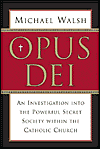
Opus Dei: An Investigation Into the Powerful, Secretive Society Within the Catholic Church
Walsh, Michael J.
Unemotional and Understated
Certainly Walsh has received reviews of this book which criticize his analysis of an old doctrinaire of practice from the late forties or fifties in an attempt to explain what exactly Opu Dei was, is, and will be. But there is obviously such little documented, and if documented, then available, research data on this topic.
Where else could the followers of Escriba then be observed professionally but in their liturgical material?
For a group which is particularly introspective, and obviously capable of extremely effective influence in Church hierarchy, any documented evidence must be considered credible data for objective analysis. Walsh is also accused of extreme emotionalism in his review of Opus Dei, which again, seems baseless. He interviewed first-hand accounts from former members. Anecdotal evidence? Of course. Emotional? Why would these people bother to explain their experiences other than to inform and instruct the unwary?
As anyone who has read this book with the intention of merely learning more about Opus Dei from a scholarly point of view, as in, objectively, there are few other texts written on the topic. Thus, Walsh's emotion appears pretty subdued, as by logic it is an unrequired element of his task, which I believe he performed fairly well. It is the first I had read of this Escriba De Balaguer and it was a powerful reinforcement of other books I have read about Catholic Church practices, Hans Kung's "A Short History..." and "The Shroud of Secrecy" by the Millienari.
In line with the reviews of other writings upon the lives of saints, I have read some pretty fantastic whoppers of miracles performed, but never of such base, and documented, comments made about people as those Walsh attributes to Balaguer.
Much conjecture is made of certain events, mostly the financial elements of the early 1980s and the Ambrosian Bank. But such books are of little consequence in effective change management of Catholic hierarchy.
It is a little like brand marketing tactics. The most loyal of followers or brand loyalists are the most unlikely to change their affiliations and Opus Dei is described by Walsh as a pseudo-sect, an extremely orthodox contingent of The Church.
The upper echelons of the Vatican are also unlikely to be seriously effected by such critical reviews of Church practice, as the ultra-conservatives remain in control there, and the liberation theology spoken of by Walsh is still mostly directed at global laity.
By the time the laity actually impact upon the rule makers of Catholicism, where will Opus Dei be then? It appears clear that by any dogmatic standard, Opus Dei leaders write and rewrite the rule book at their leisure.
In the interests of Christianity, on the face of it, I agree with the author, Opus Dei does not appear very Christian. But if Opus Dei had their way, my freedom to read would also be curtailed, among many other freedoms I associate with organized religion. Nevertheless, I would be one of the pigs Balaguer speaks of, even though sinners were to be most favoured according to The Bible.
It is a logic of exclusion, an easily understood abberation of Christian values that Opus Dei appears to practice as described in this book, which they would quickly discredit. I have not read the Da Vinci Code but I might consider non-fiction as a result of this read.

No comments:
Post a Comment